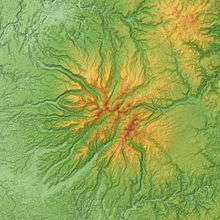Mounts of Cantal
The mounts of Cantal (or volcanos of the Cantal) are a mountainous massif in the mid-west of the Massif Central, France, made up of the remnants of the largest stratovolcano of Europe, which was formed from 13 million years ago and last erupted approximately 2 million years ago. However, The main part of the volcanic activity concentrated between 8,5 and 7 million years. Thereafter, the original volcano was largely eroded, massive landslides occurred, and it was further eroded by glaciers and water.[1]
Geomorphology

The stratovolcano of Cantal is the widest in Europe. It has a circular form and a diameter between 50 and 70 km wide. Its highest point is the Plomb du Cantal (1 855 m) located in the eastern part of the massif. Around 20 valleys have been formed in the range, iradiating out from the centre and cutting the basaltic plateau into triangular pieces called planèzes. These valleys were occupied by glaciers during the quaternary era what explain their U-shape.
Topography
Main summits
The mounts of the Cantal are composed of several summits, the best known being the Puy Mary (1,787 m), which offers a beautiful panorama from its summit, the Plomb du Cantal (1,855 m), accessible from the ski resort of Super Lioran and from the pass of Prat-de-Bouc; the Puy Griou, (1,690 m), the Puy Chavaroche, (1,739 m), the Puy of Peyre-Arse, which culminates at 1 806 m, offering a magnificent panorama of the glacial valleys of Santoire and Impradine; the Puy of Seycheuse (1,650 m), which offers a panorama of the glacial circus of Santoire and the valley of Alagnon.
Economy
The major part of the economy concentrates on the agriculture and in particular the bovine breeding. The local breed of cattle is the Salers cattle, brought up for its meat and for its milk (Cantal cheese, Salers cheese).
Besides, there is an activity of winter sports in Super Lioran, the biggest ski resort of the Massif central.